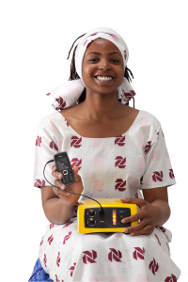Life without mains power could become a little easier for billions in the developing world with the launch this week of a battery designed specifically for use off-grid.
The ReadySet is an ‘intelligent’ battery from newly formed social venture company Fenix International that can be charged in just a few minutes using a variety of renewable power sources including bicycle generators and solar panels. Fenix claims its ‘plug and go’ design means it can power most applications including lighting, communications, medical and entertainment devices.
Aimed primarily at the 2.6 billion people in the third world who live without reliable power, the 12 volt lead acid battery includes two cigarette-lighter and two USB ports for charging mobile phones, LED lights, fans, or other small devices. The company says it was designed to cope with years of frequent charging and to be adaptable to different power sources.
The $150 dollar price tag may seem affordable to those in the west, but it is way beyond the means of most people in the third world where incomes can be as low as a couple of dollars a day. So the Readyset is not being targeted at individuals but at co-ops and small entrepreneurs who would act as micro generation businesses by charging people to use it for repowering their gadgetry.
In a trial in Uganda, Fenix says it found that people can earn about $50 a month with a combination of selling phone charge time and reduced spending on kerosene fuel for lighting.
Fenix claims the battery can be charged in an hour using a 100 watt cycle generator or in six hours with a 15w solar panel.
Currently many off-gridders in both the developed and developing word rely on car and truck batteries for power. The problem is that they tend to have a short working life because of damage caused by constant charging and emptying.
Demand driven by mobiles
According to Fenix ceo Mike Lin, the ReadySet was developed in response to the soaring demand for power in the third world which is being driven by mobile phones. “There are now 500 million off-grid mobile phone subscribers around the world right now but growth is being limited because of no power or unreliable power,” he told techie web-site C-net.
“We’re essentially giving access to new energy options, particularly in frontier markets like India and up-and-coming markets like Kenya,” said. “Rather than try to make cheaper and cheaper products for poor people, the notion is: what if we design a product that may actually generate income?”
The company’s plan is to sell its ReadySet batteries with a power source, such as a solar panel or bicycle generator. It will be distributed through phone distributors which, says the company are losing potential revenue because customers can’t power their phones.
Grid “too expensive”
“This model is largely taking inspiration from the mobile market, which is independent, decentralized, and can be deployed quickly at massive scale,” said Lin. Expecting the grid to reach villages of Kenya or Uganda, for example, is unrealistic because of the expense of the centralized model of power delivery.
Fenix is now negotiating with distributors in Africa, India, Bangladesh, and Latin America, the company said. It plans to first launch its products in four African countries first.

